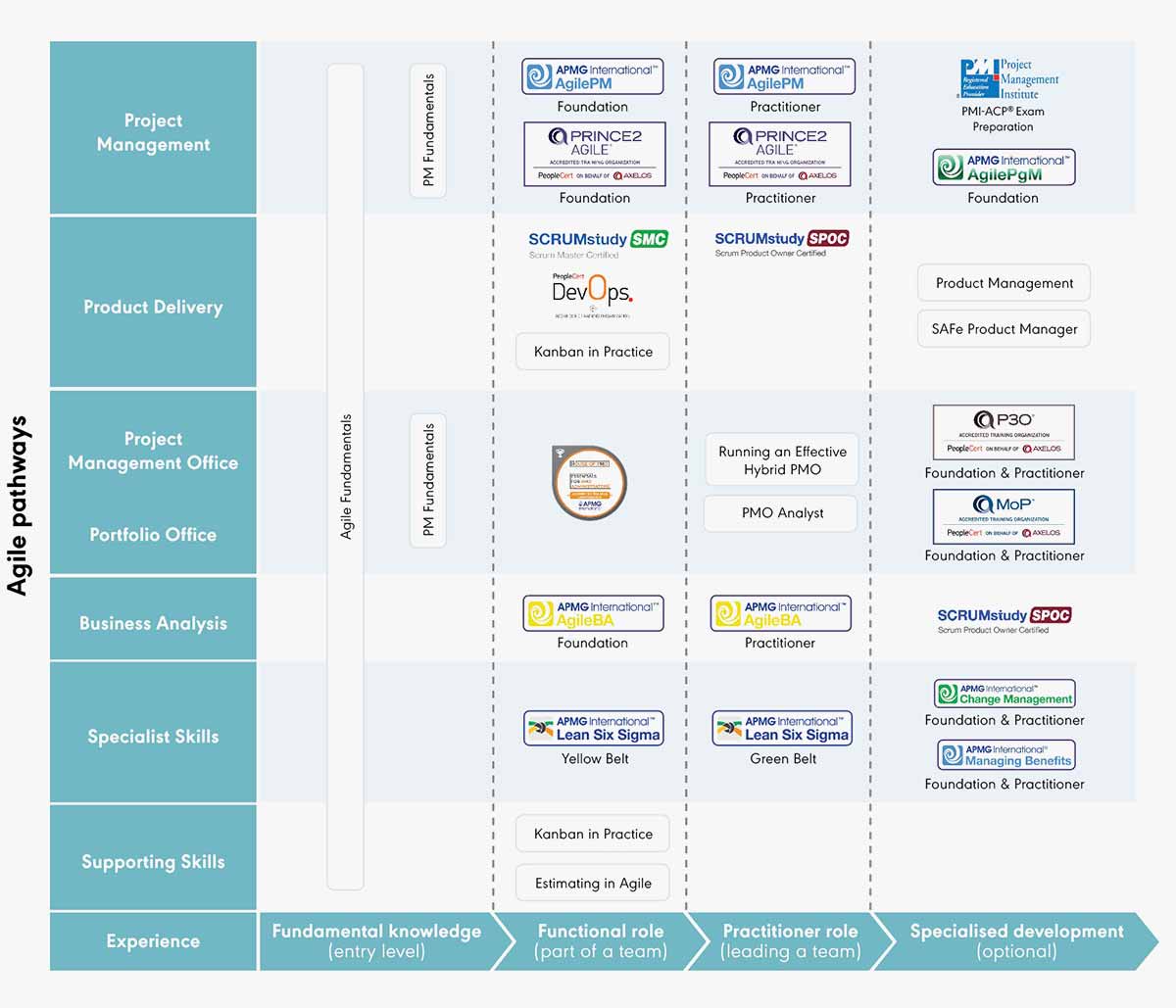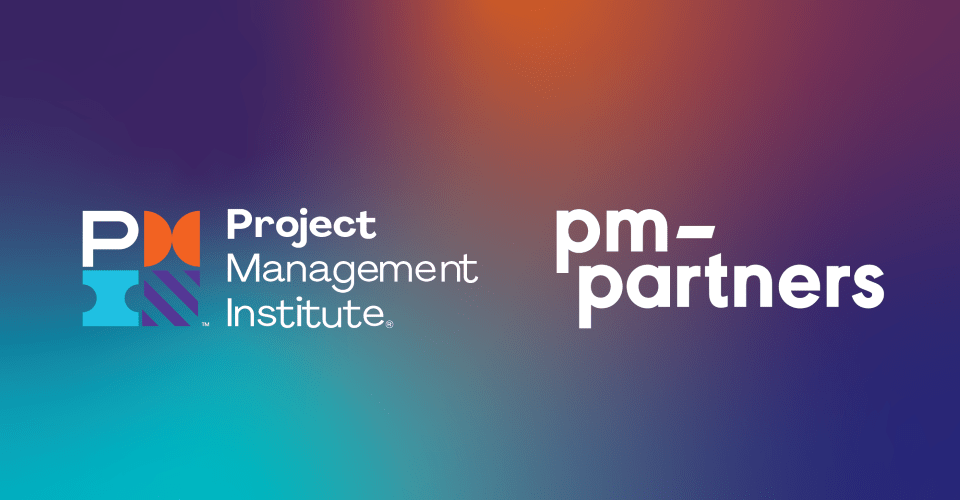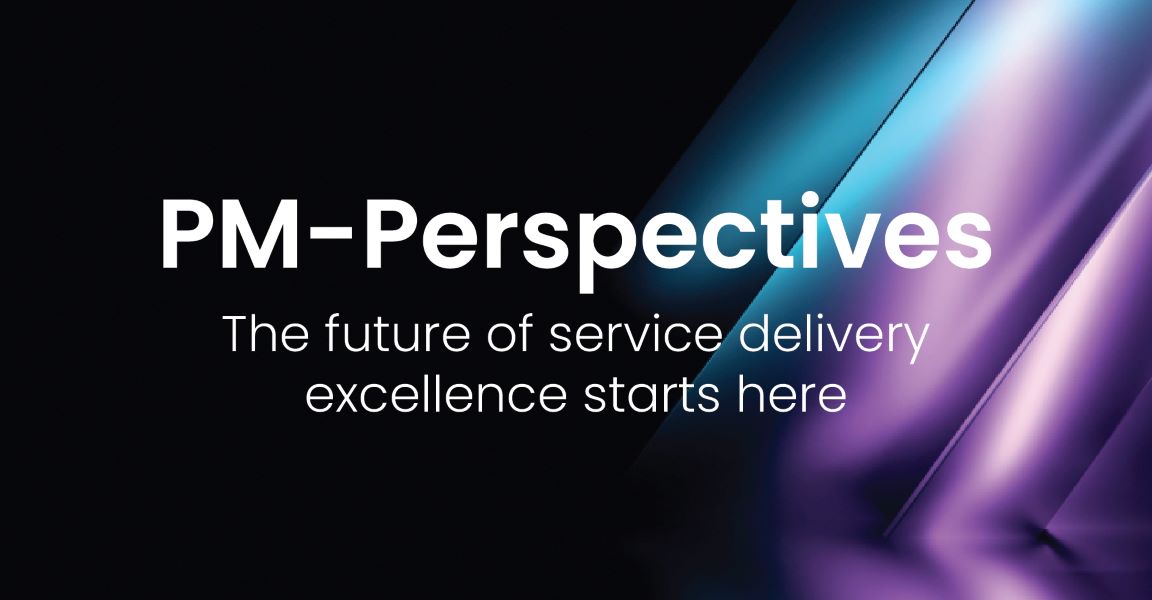What is the best agile certification in Australia?

As awareness grows of the advantages of implementing agile project management into organisations, the training market is becoming increasingly saturated with agile certifications. Here Jourdan Clark, Professional Development Manager at PM-Partners, explores how certification can benefit you and your team and what to consider when choosing a course.
In today’s highly competitive job market, any edge you possess as a project, programme or portfolio management professional can make all the difference. As technology disruption continues apace, Australian organisations are increasingly in need of agile professionals who can react to changes quickly and efficiently and move projects forward with the right priorities. They’re also adopting agile methods to ensure projects are completed in a timely fashion with a focus on quality and consistency throughout the project lifecycle.
Agile approaches focus on breaking down projects into smaller, more workable sections to ensure the agile team can deliver value throughout. To help make the shift to agile and ensure its effective implementation, businesses in Australia, and around the world, want candidates with agile credentials. This means obtaining a recognised agile certification gives any working professional an advantage over their non-certified counterparts, resulting in better pay and more job security.
So what agile certification is best for today’s project, product or programme manager and how will becoming a certified agile practitioner benefit your career? Keep reading to find out.
Becoming agile: why certification matters
There’s been a lot of research to indicate that agile practices can be a game changer on an organisational level. Recent results show that agile projects are statistically more likely to succeed than waterfall projects, particularly where the focus is on the delivery of new technologies. However, many professionals are still waking up to the benefits of becoming agile on a personal level.
For instance, the scope of employment for any agile candidate with professional certification can improve significantly. Agile-certified candidates are typically in high demand, and their pay is often better than their non-certified counterparts. In Australia, the average salary for an agile business analyst is $135,000.
Additionally, since credible agile certifications are recognised globally, professionals with the right agile training can improve their career options and diversify their skill sets. This means they can grow in their fields or choose to expand to new careers in other sectors or industries.
How agile certification can help your career
Agile certifications benefit the following professionals:
- Project manager
- Product manager
- Scrum master
- Product owner
- Team leader
- Working or aspiring agile coaches
- Iteration manager
- Leadership roles in agile projects
- Development team members.
Regardless of which role you’re in, becoming a certified agile professional offers the following benefits:
Strengthens your skills: Effective agile training equips you with skills such as teamwork, allocation of tasks and duties, and time management that you can use to complete projects successfully.
Change in mindset: Agile professionals understand that today’s working environment is dynamic and constantly changing and they possess the ability to react and adapt to this change quickly.
Improved performance: Agile professionals have the necessary skills and knowledge required to deliver consistent value with each project, improving overall output and performance.
Hands-on knowledge by practice: The best agile certification gives you hands-on practice in implementing agile within an organisation. You can use this working knowledge to showcase your skills and advance your career.
Access to a community of agile professionals: Effective agile certification training programs give you access to a community of other agile professionals you can network with and learn from for career advancement and growth.
Better career prospects: As mentioned earlier, agile certifications can give you an edge, improving your hiring credibility. With this comes the potential for increased financial benefits, more job security and numerous opportunities for career advancement and growth.
Choosing the best agile certification course in Australia
Choosing the best agile certification course to enrol in can be challenging. There are a lot of agile training programs to choose from and various aspects to consider. To help you decide, here are eight key factors to bear in mind when choosing a certification course:
1. Relevance
Different agile certification courses equip learners with different skills and knowledge required to work in an agile environment. So, what you choose will vary depending on the course’s relevance to your current role, working environment and career goals.
For example, if you’re a project manager looking to broaden your knowledge and work within agile environments, the Agile Project Management (AgilePM®) is a great choice. Alternatively, if you’re looking to work in a Scrum environment or Scrum role, Scrum Master Certified (SMC®) is a better option. According to the 16th Annual State of Agile Report, 58 per cent of agile teams use Scrum, so becoming a certified Scrum Master equips you with the knowledge to work in both agile and Scrum environments.
2. Type of certification
There are numerous agile certifications, from beginner and novice levels to expert and advanced. When choosing the type of certification, go for credible, highly respected, and international certifications that open up opportunities and help you climb the career ladder.
3. Reputation of the provider
The market is flooded with agile certification providers all claiming to offer the best agile certification training. Choosing a reputed training provider with the right credentials is vital to ensure you get proper training. An agile training provider should be able to tick the following boxes:
- Offers widely accepted and recognised agile certifications
- Is registered and licensed and provides accredited training
- Uses experienced training professionals and highly qualified agile practitioners
- Offers valuable advice tailored to your specific goals
- Focuses on developing your practical skills through projects and case studies
- Is readily available to guide you through training, and throughout your career.
4. Learning environment
Some people learn better in a structured learning environment, others in a more interactive environment and others prefer a self-study option. So, consider which learning environment suits you best and choose a course that offers it.
You may find some agile training courses are virtual, which can be useful if you have limited time or find it difficult to attend a training centre. Others are in-person and typically offer more opportunities for engagement with coaches and peers, while others provide a hybrid or integrated approach giving you a choice of learning environments.
5. Teaching methods
It’s wise to select agile certification courses that are more practical than just theoretical. Practical courses equip you with hands-on experience that you can quickly implement back in the work environment to showcase your skills, progress your career and support your organisation’s agile journey.
6. Class size
Agile certification courses cater to classes of any size, from public classroom settings to in-house settings. Typically, public courses cater for up to 20 people as a maximum, while the optimal size for an in-house course is 12 to 16 participants.
7. Facilitator experience
You want to choose courses delivered by highly experienced agile practitioners and agile coaches. They can share their vast expertise and knowledge of agile practices and methodologies and draw from real-life experience.
8. Value
When choosing an agile certification course, consider the value of the certification. As a rule of thumb, a widely accepted and recognised certification is ultimately more valuable.
Which agile certification is best for me?
The best agile certification for you is the one that’s most relevant to your role, work environment and personal and professional goals. You’ll also want to consider where your organisation is on its agile journey – for instance, is it adopting agile in one team or department only or looking to scale agile across the enterprise?
To help you decide, we’ve listed some of the top agile certification courses for project managers and other practitioners keen to work in agile project management or support agile delivery.
9 of the top agile certificates
1. Scrum Master Certified (SMC®)
The Scrum Master Certified (SMC) course is the best option for beginners and is ideal for anyone who’s interested in becoming a certified Scrum master. The course provides a deep understanding of the Scrum framework, including its principles and philosophy, while providing practical knowledge of Scrum roles and agile project management setups.
The SMC course prepares you to take and pass the online Scrum Master Certification Exam. This course is highly valuable for project managers, product owners and professionals who are just starting out and want to learn how to work in different agile environments.
2. Scrum Product Owner Certified (SPOC®)
The Scrum Product Owner Certified (SPOC) course is designed for professionals working as product owners in Scrum teams and interacting with stakeholders. It provides hands-on, practical experience on the responsibilities, perspective, tools, and techniques employed by product owners.
The SPOC course is highly valuable for product owners who want to learn how to implement agile and Scrum practices within their roles to improve performance and ensure consistent delivery.
3. Agile Project Management (AgilePM®) Certification
The Agile Project Management (AgilePM) Foundation to Practitioner Certification course addresses the needs of project managers, business analysts and team leaders who work in agile environments and with agile teams. The course equips these professionals with the necessary skills and knowledge to work effectively in the sphere of agile project management, specifically in dynamic work environments that require adaptability and flexibility.
The AgilePM Certification consists of:
- The Foundation course: This lays a solid foundation for managing projects in agile environments based on a subset of the DSDM® (Dynamic System Development Method) framework and prepares participants for the AgilePM Foundation certificate.
- The Practitioner course: This builds on the Foundation course focusing on the application of AgilePM to prepare candidates for the Practitioner exam.
Both courses are highly valuable for practising project managers and agile team members seeking careers in agile project management.
4. Agile Programme Management (AgilePgM®)
The Agile Programme Management Foundation Certification is designed for programme management professionals who want to understand and apply agile practices. The course allows programme managers to adopt agile principles and methods, which ensure a programme can react and evolve to business change in an increasingly dynamic landscape.
5. Agile Business Analysis (AgileBA®) Certification
The AgileBA Foundation to Practitioner Certification is designed to equip business analysts with the skills and knowledge to perform effectively within agile teams. The course comprises hands-on practice and comprehensive guidance on the responsibilities, roles, and skills of an agile business analyst. Change analysts, system analysts and project managers can also benefit from completing this course.
6. PMI Agile Certified Practitioner (PMI-ACP®)
The PMI-ACP Certification is ideal for anyone who works in an agile environment and wants to acquire an agile certification credential of the highest calibre. The course enables participant to build a comprehensive knowledge base of agile best practices to equip them with tools, techniques, and methodologies they can implement within their organisation.
The PMI-ACP is highly valuable as it’s globally recognised, so individuals with this certification can explore more career advancement and growth opportunities.
7. PRINCE2 Agile® Certification
The PRINCE2 Agile Foundation to Practitioner Certification combines the flexibility of agile with the governance of PRINCE2. It’s ideal for project managers and professionals who deliver projects in an agile environment. The course teaches participants how to tailor PRINCE2 in an agile context to improve performance and deliver consistent results throughout the lifecycle of a project.
8. AgileSHIFT ® Enterprise Agility
The AgileSHIFT Training Certification helps to prepare everyone across an organisation for transformational change. Due to the dynamic work environment and the constantly evolving landscape, professionals must learn how to adapt quickly to change and react to stay competitive. This course teaches professionals how to thrive in a competitive and disruptive market.
9. Leading SAFe ® 6.0 Certification
Taking the Leading SAFe 6.0 Certification helps participants gain the knowledge necessary to lead a Lean-Agile transformation by leveraging the Scaled Agile Framework® (SAFe®). The course explores the competencies needed to become a Lean enterprise and provides a practical understanding of how to apply the values and principles of a Lean-Agile mindset.
Not sure what agile learning pathway or certification course you should take?
Our infographic table gives you a broad picture of the options available to you and should help to narrow down your selection.

Start your certification journey
If you’re looking for a reputable Agile certification training provider, you can be confident that PM-Partners ticks all the right boxes. We’re a well-established training, delivery and consultancy firm providing industry-leading agile education from individual to enterprise level.
Through our partnerships with accreditation and examination institutes like APMG, Axelos, PeopleCert and Scaled Agile, we offer a wide range of globally recognised, best practice agile certification courses catering to a variety of roles, including project and programme managers, PMOs, team leads and business analyst.
Why train with PM-Partners?
“Great course, engaging and knowledgeable trainer. He kept the online group and classroom group together and engaged. Thank you!” – Lesia Wing
The right training and certification programs help to sharpen your skills, broaden your knowledge, and improve your hiring credibility. PM-Partners understands this, which is why we promise the following:
- Our courses are up-to-date, relevant, and will equip you with the necessary skills and knowledge to work successful in agile environments
- Our agile trainers are highly qualified with in-the-field experience to ensure participants gain real-life knowledge and practical skills they can implement in their roles and contexts
- Our integrated training solution ensures trainers are skilled in both virtual and in-person delivery giving you a choice of high-quality learning environments
- Our globally recognised qualifications are aligned to best practice and cover the gamut of agile methods, frameworks, and disciplines, including Scrum, Kanban, DSDM, Lean-Agile and SAFe.
Regardless of the agile certification you seek, our courses will equip you with the practical skills to work successfully in an agile context and advance your career. But there’s no need to take our word for it. We recently surveyed our past students and 91 per cent would recommend their PM-Partners course, while 96 per cent would study with PM-Partners again.
So, what are you waiting for?
Get in touch with us today to start your certification journey or book your next agile certification course online and save 10%.
Trademarks & attributions
SMC® and SPOC® are trademarks of SCRUMstudy. AgilePM® / AgilePgM® / AgileBA® are registered trademarks of Agile Business Consortium Limited. All rights reserved. The APMG-International AgilePM/ APMG-International AgilePgM/ APMG International AgileBA and Swirl Device logos are trademarks of The APM Group Limited, used under permission of The APM Group Limited. All rights reserved. PMI Agile Certified Practitioner (PMI-ACP) is a registered mark of the Project Management Institute, Inc. PRINCE2®/ PRINCE2 Agile®/ AgileSHIFT® are registered trademarks of AXELOS Limited, used under permission of AXELOS Limited. All rights reserved. The Swirl Logo™ is a trade mark of AXELOS Limited, used under permission of AXELOS Limited. All rights reserved. Scaled Agile Framework® and SAFe® are registered trademarks of Scaled Agile, Inc.

About The Author
Jourdan Clark
Professional Development Manager, PM-Partners
Jourdan is always up to date with the latest in global best practice standards and certifications. Working daily with product, project, programme and portfolio managers, as well as change managers and business analysts, she is adept at aligning her customer’s aspirations with the optimum training program for their needs. Whether their journey involves progressing from project manager to head of PMO, or supporting their organisation’s transition to Agile product delivery, Jourdan is the person to speak with.








